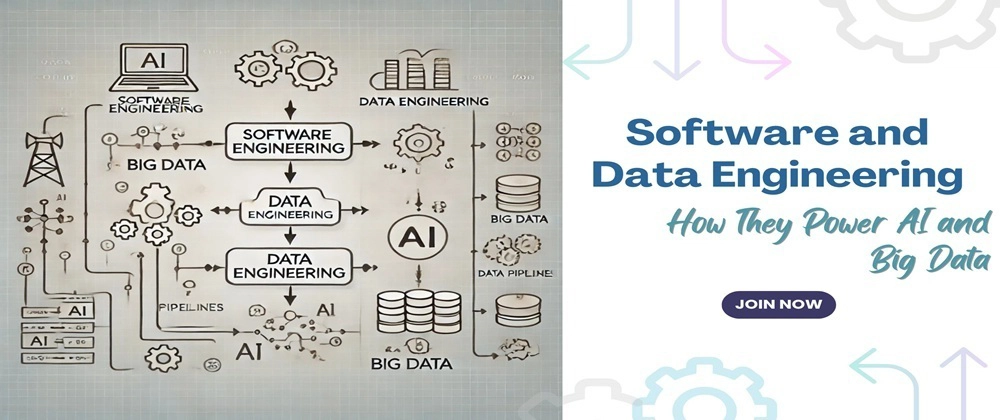Data powers the world, but engineering makes it useful. Software engineering builds the systems we rely on, while data engineering ensures smooth data flow and large-scale processing. They form the foundation of modern technology.
AI and Big Data are interdependent. AI requires high-quality, structured data, which data engineering provides. AI is then transformed into real-world applications through software engineering, which makes them more accessible and efficient.
As the demand for faster, smarter, and more scalable solutions increases, robust data systems are more important than ever. Businesses that successfully implement these technologies enjoy a significant competitive advantage.
The Synergy Between Software and Data Engineering
Software Engineering:
The foundation of AI applications, including the frameworks, algorithms, and interfaces that bring intelligent solutions to life. From sleek mobile apps to sophisticated corporate systems, every AI-powered solution is built on strong software design.
Data Engineering:
An AI powerhouse capable of processing large datasets with precision. AI and data engineering collaborations ensures that data is clean, formatted, and optimized, providing AI models with the information they need to provide relevant insights. Without a reliable data infrastructure, even the most intelligent AI will be weakened.
Why They Must Work Together:
Software provides the tools, while data fuels the intelligence. When these two factors work together, businesses can make smarter decisions, enhance their solutions, and innovate using AI to achieve success.
The Role of Data Engineering in AI & Big Data
AI is only as good as the data it is trained on. Even the most advanced AI models cannot provide significant insights unless the data is clean, structured, and well-managed. This is where data engineering comes in, transforming raw data into valuable assets. This is where data engineering solutions play an important role, transforming raw data into valuable assets that power AI-driven success.
Data Collection & Integration
Data is collected from multiple sources, including databases, APIs, sensors, and user interactions. Data engineering collects structured and unstructured data from multiple sources, ensuring easy integration with AI and analytics.
Data Pipelines & ETL Processes
Raw data is chaos. Extract, Transform, and Load (ETL) cleans, processes, and structures data so that it can be used in AI models and big data applications. A properly built data pipeline ensures accuracy, consistency, and efficiency.
Scalability & Real-Time Data Processing
As the volume of data increases, scalable solutions become necessary. Real-time data processing helps businesses make data-driven decisions in real time, enabling AI-driven recommendations, fraud detection, and dynamic analytics.
AI and Big Data can be fully realized through strong data engineering, which transforms raw information into intelligent action.
Key Technologies Powering AI & Big Data
AI and Big Data thrive with the right technology stack. State-of-the-art data engineering tools and platforms enable anything from processing large-scale datasets to training machine learning models. Here are the essential technologies driving innovation:
Big Data Tools
Apache Spark & Hadoop – Powerhouse frameworks for distributed data processing.
Snowflake & Databricks – Cloud-native platforms for scalable data analytics and AI integration.
AI & ML Frameworks
TensorFlow & PyTorch – Leading deep learning frameworks for AI model development.
Scikit-learn – A go-to library for machine learning algorithms and data analysis.
Cloud Platforms
Scalable cloud solutions for AI and data engineering, including storage, compute, and machine learning services.
Databases & Storage
SQL and NoSQL databases provide structured and flexible solutions for various AI tasks.
Data lakes and warehouses are centralized storage systems for managing large amounts of structured and unstructured data.
Businesses can use AI and big data to make smart decisions and develop creative solutions.
Challenges & Solutions in AI-Powered Big Data Engineering
AI-driven big data has issues like unstructured, incomplete or biased data, which can distort the results. Data quality is ensured through automated validation, deduplication and bias detection. Scalability is another challenge, as real-time data streams generate large volumes. Distributed computing with Apache Spark, Kafka and cloud solutions allows for more efficient processing.
When many data sources, APIs and third-party systems are linked, integration becomes difficult. ETL pipelines, data lakes and API orchestration help streamline data flow and provide smooth communication. By addressing these difficulties, data engineering enables AI to provide accurate, reliable and scalable insights.
Conclusion
Collaboration between software engineering and data engineering is driving the future of AI-powered products. As businesses increasingly rely on AI and big data, investing in a robust data infrastructure and scalable AI systems is no longer optional—it’s a competitive imperative. Companies that adopt modern data engineering and AI-powered strategies gain competitive advantage through better decision-making, real-time insights, and inventive solutions.
Partnering with professionals like Lucent Innovations ensures that AI and big data technologies are seamlessly integrated, allowing businesses to seize new opportunities and scale efficiently. Now is the time to leverage cutting-edge AI and data solutions to accelerate growth and leave competitors behind!



Top comments (0)